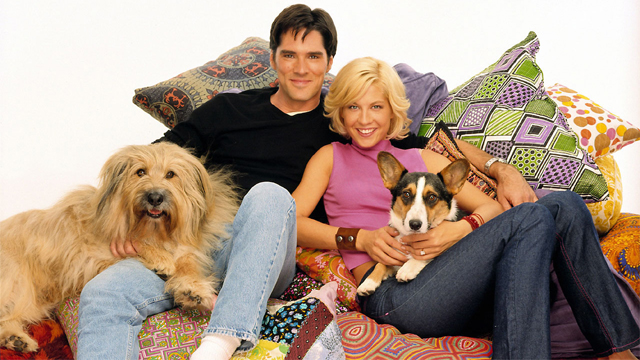There's a lot of Full House nostalgia going on right now (the '90s are hot!), especially in San Francisco. We embrace it at this blog too. I'm not down on the show by any means. I watched as a kid and remember how neat it was to see my city portrayed on the small screen.
Upon limited rewatching of the Tanner family's antics in five minute bursts (it's not the attention holder it was when I was six), I was disappointed to find the show's San Francisco setting was mostly inconsequential. In addition to shooting in studio (although the opening credits were famously shot in Alamo Square and at other local landmarks), the references to the cultural life of the city are few and far between. Yes, this is a show centered around three men living together in a nationally recognized gay Mecca, so occasionally a very benign reference to the city's gay culture will pop up (see Uncle Jesse serenading Joey with "Love Me Tender" in the tub for a more general example), but the show could have just as easily been set in another city without a drastic change in tone. Two years after Full House left the airwaves in 1995, ABC again set another sitcom in the City by the Bay, only this time much of the humor and premise were very dependent on the San Francisco locale.
Dharma and Greg was centered around a classic formula: uptight man meets free spirited woman, they fall in love and hilarity ensues. It's a premise that's worked before: see most of the screwball comedies of the 1930s (Cary Grant and Katharine Hepburn perfectly embody this dynamic) and most of the fantasy/domestic sitcom hybrids of the 1960s (I Dream of Genie is sort of a magical version of Dharma and Greg, if you squint). Handsome college Republican Thomas Gibson played Pacific Heights-bred Greg Montgomery (his main job on the show was to have Darren Stevenseque reactions to his wife's antics), while Jenna Elfman portrayed Dharma "Freedom" Finkelstein, the bohemian daughter of Summer-of-Loving Marin-ites (Dharma's raison d'etre was to give Greg something outside his culturally conservative comfort zone to react to). The couple meet on the Muni Metro in the first episode, take an impetuous first date to Reno and are impulsively married by the second commercial break. The minute you meet Dharma and Greg's families, the show shifts from sitcom to San Francisco specific social satire.
Greg's parents, Kitty and Edward, are high society stereotypes played by Susan Sullivan and Mitchell Ryan. Both are permanently sucking martinis, talk without ever once unclenching their jaws and are prone to "let them eat cake" social statements. Dharma's parents, Abbey and Larry, are the Montgomerys old hippie polar opposites. Abbey sees auras and midwives, Larry drives a VW bus and doesn't trust the government. It's a culture clash that's been happening since 1966. Your typical episode went something like this:
Dharma and Greg spend 30-45% of most episodes making out, in bed or sitting on each others' laps because this conservative lawyer and liberal yoga teacher have mad sexual chemistry! What else could be keeping such wildly different people together? Dharma wants the couple to do something whimsical and risk-taking like paint themselves with vegetable dye and illegally bungee jump off Coit Tower or put on a piece of political theater on a burning barge. Greg objects, he prefers to play it safe. Larry and Abbey side with Dharma. Larry shares a conspiracy theory, is probably stoned. Abbey thinks everything can be cured through vegetarianism and communion with your spirit animal. Edward and Kitty side with Greg. Edward name drops George Shultz, furrows his brow and is probably drunk. Kitty wears Chanel and doesn't care for Dharma's taste in furniture. Through misadventure, Greg learns to loosen up and Dharma learns to respect the norms of mainstream society. Dharma and Greg hop back into bed and forget everything they learned about compromise.


